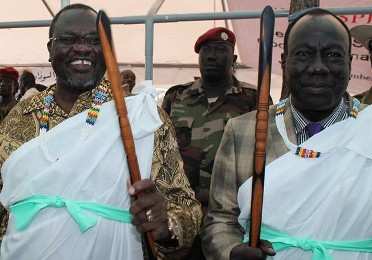Equatorian top rebel leader lambastes position of home governors
February 22, 2015 (ADDIS ABABA) – The deputy chairman and commander-in-chief of the rebel Sudan Peoples’ Liberation Movement (SPLM-IO), has accused governors of the three states of former greater Equatoria region of betraying the cause of his people and vowed not to be part of a peace agreement that will not address the root causes of the 14-month old war in the country.

In the press release dated 21 February he criticised the change of mind by the governors of Central, Eastern and Western Equatoria states which shifted from supporting implementation of federalism during a transitional period to deferring it to a permanent constitutional making process for consideration.
“Equatorians in South Sudan and outside the country, reject the document of the three governors of Equatoria presented to the IGAD that James Wani Igga should remain as vice president because it only advances personal interests of the ruling elites at the expense of the broad masses of Equatorians and South Sudanese at large,” he said in the Saturday’s press release seen by Sudan Tribune.
“Therefore, it is of paramount importance to look at the total transformation of the system in South Sudan rather than looking at maintaining individuals in position of power,” he added.
He described as “absurd” the demand by the governors that a vice-president should come from Equatoria, saying this was demoting Equatorians as they were equally competent to compete for position of president rather than vice president.
The top Equatorian rebel commander said it was important to address the root causes of the conflict in the peace negotiations under the auspices of the Intergovernmental Authority on Development (IGAD), warning that failure to address the core issues would only “entrench dictatorship” and “postpone the conflict for later days.”
He reminded that the position of Equatorians was to establish a federal system of governance in the country in accordance with the resolutions of the Pagak consultative conference which the rebel group convened in December last year.
“Without this, count Equatorians out of the so-called peace agreement in Addis Ababa,” he warned.
The rebel leader who also hails from the Bari ethnic group like James Wani Igga also said he wanted to see a peace agreement clearly stating that the national capital must be removed from Juba and relocated to Ramciel as previously resolved by the government before the war broke out.
It was not clear why he did not react at the time of the governors’ presentations, but assured that he would from now on be updating the people on positions of Equatorians in the emerging developments in the peace process.
(ST)
